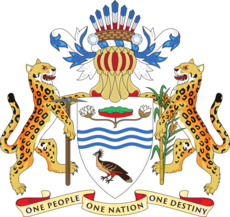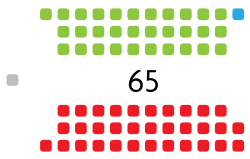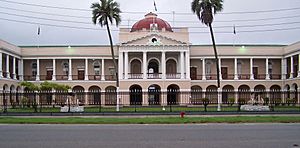National Assembly (Guyana) facts for kids
Quick facts for kids National Assembly |
|
|---|---|
| 12th Parliament of the Co-operative Republic of Guyana | |
 |
|
| Type | |
| Type | |
| Leadership | |
|
Mark Phillips (PPP/C)
Since 2 August 2020 |
|
|
Speaker
|
Manzoor Nadir
Since 1 September 2020 |
|
Leader of the Opposition
|
Aubrey Norton (APNU+AFC)
Since April 2022 |
| Structure | |
| Seats | 65 |
 |
|
|
Political groups
|
Government
Other opposition
|
| Elections | |
| Proportional representation | |
|
Last election
|
2 March 2020 |
|
Next election
|
2025 |
| Meeting place | |
 |
|
| Parliament Building Georgetown, Guyana |
|
| Website | |
| National Assembly | |
The National Assembly is a very important part of the government in Guyana. Think of it as a big meeting place where elected representatives from all over the country come together. Along with the President, the National Assembly forms the Parliament of Guyana.
There are 65 members in the National Assembly. These members are chosen by the people of Guyana through elections. Twenty-five members are elected from different areas (called constituencies) across the country. The other forty members are chosen based on how many votes their political parties get overall. This system helps make sure that different groups and ideas are represented.
A special person called the Speaker leads the meetings of the National Assembly. The Speaker makes sure everyone follows the rules and that discussions are fair. Sometimes, the Speaker is one of the elected members, and sometimes they are chosen from outside the Assembly. If the Speaker is not an elected member, they don't vote on issues. If there's a tie vote, and the Speaker can't vote, then the idea doesn't pass. The members also choose a Deputy Speaker to help out.
Contents
Who Makes Up the National Assembly?
The National Assembly includes several key people who help it run smoothly:
- The Speaker, who leads the meetings.
- The Clerk and Deputy Clerk, who manage all the official paperwork and records.
- 65 elected members who vote on new laws and important decisions. Some of these members might also be government ministers.
- Other ministers and parliamentary secretaries who are appointed by the President. They can join discussions but usually don't vote.
How Many Members Need to Be Present?
For the National Assembly to officially start a meeting and make decisions, a certain number of members must be there. This is called a quorum. The rules say that at least one-third of the elected members need to be present. This ensures that enough people are there to represent the country's views fairly.
Where Does the National Assembly Meet?
The National Assembly usually meets in the beautiful Parliament Building in Georgetown. It's a historic place where many important decisions have been made.
Sometimes, for special reasons, the President can decide that the Assembly should meet somewhere else. For example, in 2020, during the Covid-19 pandemic, they met at the Arthur Chung Convention Centre. This was to make sure everyone had enough space to stay safe.
The predominant color of the seats and carpet in the Parliament Chamber is green. This color is a tradition shared with other parliaments in countries like the United Kingdom, Trinidad and Tobago, and Jamaica. Look up, and you'll see a very fancy ceiling designed by an architect named Cesar Castellani!
How Long Do Members Serve?
A group of elected members in the National Assembly serves for a period called a parliamentary term. Usually, this term lasts for five years. It starts from the day the new National Assembly first meets after a general election. The President announces when and where this first meeting will happen.
Sometimes, this five-year term can change. The President can decide to end the term early and call for new elections. This might happen if the government loses the support of the majority of the members.
The term can also be made longer if there's a serious situation, like a war or a national emergency. However, these extensions are only for a limited time. The President can also temporarily suspend the National Assembly for up to six months, which is called prorogation.
How Are Laws Made?
Making laws is one of the most important jobs of the National Assembly. Any member can suggest a new idea for a law, which is called a bill. However, if a bill is about money or government spending, it first needs approval from the Cabinet (a group of top government ministers).
The National Assembly has its own set of rules, called 'Standing Orders', to guide how it works. These rules help keep meetings organized and fair.
Once a bill is approved by the National Assembly, it still needs one more step to become a law: the President's approval. This is called 'assent'. The President can say no to a bill once, but they must explain why to the Speaker within 21 days.
If the President says no, the National Assembly can vote again. If two-thirds of the members still want the bill to become law, they can send it back to the President. This time, the President must approve it within 90 days.
After a bill gets the President's approval, it becomes an official law. These new laws are given a number and year, like 'Act No. 1 of 2020'. They are then officially announced in the Official Gazette of Guyana, which is like a public newspaper for government news.
Recent Elections
The last big elections in Guyana, where people chose their President and members of the National Assembly, happened on March 2, 2020. These elections also chose members for local councils. The next elections are planned to happen by 2025.
Who Are the Current Members?
The people serving in the National Assembly right now are part of the Twelfth Parliament. They represent different political parties and regions of Guyana.
The Speaker
The current Speaker, who leads the Assembly's meetings, is:
| Name | Started Serving |
|---|---|
| Manzoor Nadir | 1 September 2020 |
Members from the Government
These members belong to the party or group of parties that form the government. They work to put their party's plans into action.
| Name | Party List | Area Represented/Notes |
|---|---|---|
| Frank C. S. Anthony | PPP/C | National Top-Up |
| Vickram Bharrat | PPP/C | National Top-Up |
| Sanjeev Datadin | PPP/C | National Top-Up |
| Juan A. Edghill | PPP/C | National Top-Up |
| Yvonne Fredericks-Pearson | PPP/C | National Top-Up |
| Joseph Hamilton | PPP/C | National Top-Up |
| Deodat Indar | PPP/C | National Top-Up |
| Bharrat Jagdeo | PPP/C | National Top-Up |
| Warren Kwame McCoy | PPP/C | National Top-Up |
| Mohabir Anil Nandlall | PPP/C | National Top-Up |
| Seepaul Narine | PPP/C | National Top-Up |
| Savitri Sonia Parag | PPP/C | National Top-Up |
| Anand Persaud | PPP/C | National Top-Up |
| Mark Phillips | PPP/C | National Top-Up |
| Bheri Ramsaran | PPP/C | National Top-Up |
| Charles S. Ramson | PPP/C | National Top-Up |
| Dharamkumar Seeraj | PPP/C | National Top-Up |
| Pauline Sukhaii | Bhagmattie Veerasammy | PPP/C - National Top-Up |
| Jennifer Westford | PPP/C | National Top-Up |
| Lee Williams | PPP/C | National Top-Up |
| Collin Croal | PPP/C | Region 1 |
| Nandranie Coonjah | PPP/C | Region 2 |
| Priya Manickchand | PPP/C | Region 3 |
| Tandika Smith | PPP/C | Region 3 |
| Vindhya Persaud | PPP/C | Region 4 |
| Susan Rodrigues | PPP/C | Region 4 |
| Hugh Todd | PPP/C | Region 4 |
| Faizal Jafferally | PPP/C | Region 5 |
| Vishwa Mahadeo | PPP/C | Region 6 |
| Zukfikar Mustapha | PPP/C | Region 6 |
| Gail Teixeira | PPP/C | Region 7 |
| Alister Charlie | PPP/C | Region 9 |
| Robeson Benn | n/a | Non-Elected Minister |
| Oneidge Walrond Allicock | n/a | Non-Elected Minister |
| Ashni Singh | n/a | Non-Elected Minister |
| Sarah Browne | n/a | Non-Elected Parliamentary Secretary (Amerindian Affairs) |
| Vikash Ramkissoon | n/a | Non-Elected Parliamentary Secretary (Agriculture) |
Members from the Opposition
These members belong to parties that are not currently in charge of the government. Their job is to question the government and offer different ideas.
| Name | Party List | Area Represented/Notes |
|---|---|---|
| Geeta Chandan-Edmond | APNU+AFC | National Top-Up |
| Karen Cummings | APNU+AFC | National Top-Up |
| Sherod Duncan | APNU+AFC | National Top-Up |
| Annette Ferguson | APNU+AFC | National Top-Up |
| Juretha Fernandes | APNU+AFC | National Top-Up |
| Roysdale Forde | APNU+AFC | National Top-Up |
| Aubrey Norton | APNU+AFC | National Top-Up |
| Volda Lawrence | APNU+AFC | National Top-Up |
| Vincent Henry | APNU+AFC | National Top-Up |
| Christopher Jones | APNU+AFC | National Top-Up |
| Coretta McDonald | APNU+AFC | National Top-Up |
| David Patterson | APNU+AFC | National Top-Up |
| Haimraj Rajkumar | APNU+AFC | National Top-Up |
| Khemraj Ramjattan | APNU+AFC | National Top-Up |
| Tabitha Sarabo-Halley | APNU+AFC | National Top-Up |
| Natasha Singh-Lewis | APNU+AFC | National Top-Up |
| Raphael Trotman | APNU+AFC | National Top-Up |
| Amanza Walton Desir | APNU+AFC | National Top-Up |
| Ronald Cox | APNU+AFC | Region 1 |
| Shurwayne Holder | APNU+AFC | Region 2 |
| Ganesh Mahipaul | APNU+AFC | Region 3 |
| Nima Flue-Bess | APNU+AFC | Region 4 |
| Catherine Andrea Hughes | APNU+AFC | Region 4 |
| Maureen Allison Philadelphia | APNU+AFC | Region 4 |
| Deonarine Ramsaroop | APNU+AFC | Region 4 |
| Vinceroy Jordan | APNU+AFC | Region 5 |
| Dineshwar Nand Jaiprashad | APNU+AFC | Region 6 |
| Dawn Hastings-Williams | APNU+AFC | Region 7 |
| Richard Sinclair | APNU+AFC | Region 8 |
| Jermaine Figueira | APNU+AFC | Region 10 |
| Devin Sears | APNU+AFC | Region 10 |
| Dr. Asha Kissoon | LJP/ANUG/TNM | National Top-Up. (Elected Deputy Speaker) |
See also
 In Spanish: Asamblea Nacional de Guyana para niños
In Spanish: Asamblea Nacional de Guyana para niños
- Politics of Guyana
- List of legislatures by country
- List of speakers of the National Assembly of Guyana
- Leader of the Opposition of Guyana

